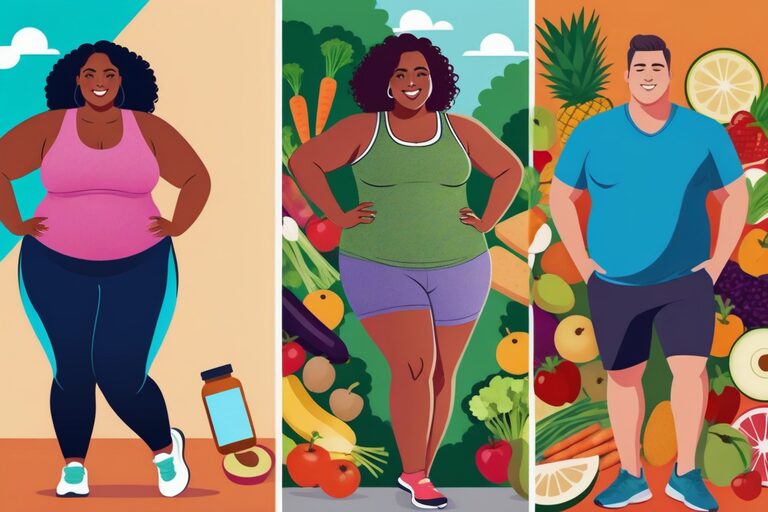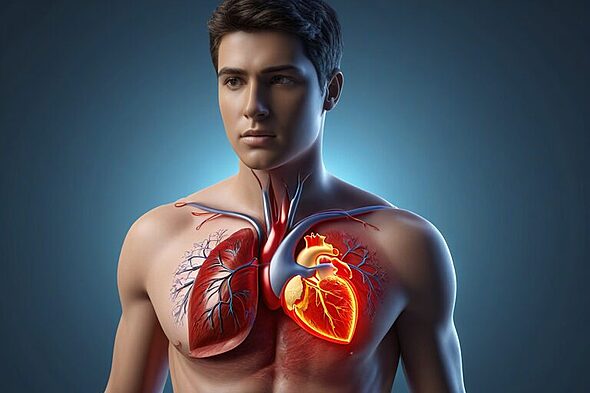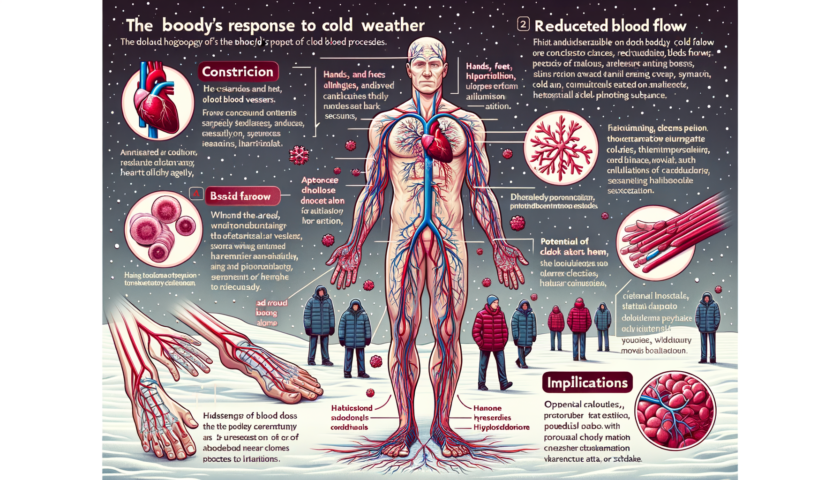Did you know that nearly 30% of the Indian population is affected by overweight and obesity? Excess weight not only impacts physical health but can also lead to various chronic diseases, affecting the overall well-being of individuals. If you are looking to shed those extra pounds and achieve a healthier weight, you’ve come to the right place. In this article, I will share the ultimate weight loss secrets, including surprising weight loss tips and strategies, to help you transform your body and improve your health.
Key Takeaways:
- Obesity affects nearly 30% of the Indian population.
- Weight loss is important for overall health and well-being.
- This article will provide ultimate weight loss secrets and surprising tips.
- These tips can help you transform your body and improve your health.
- Stay tuned for valuable insights on dieting strategies, exercise routines, and nutrition plans.
Lifestyle Changes for Sustainable Weight Loss Benefits
Making lifestyle changes is crucial for achieving sustainable weight loss. By making a shift in your mindset and adopting healthier habits, you can embark on a successful weight loss journey that promotes long-term results. In this section, we will explore key lifestyle changes that can support your weight loss goals.

Abandoning the Concept of Dieting for a Healthier Mindset
Instead of viewing weight loss as a short-term diet, it’s important to embrace a healthier mindset towards food and body image. Focus on nourishing your body with nutritious foods, rather than restricting yourself with fad diets or extreme measures. By shifting your perspective and creating a positive relationship with food, you can make sustainable changes that support your overall well-being.
Setting Attainable Goals and Rewarding Progress
Setting realistic and attainable weight loss goals is essential for long-term success. Instead of aiming for drastic changes, break down your goals into smaller, achievable milestones. This approach not only boosts your confidence but also allows you to celebrate each milestone as you progress towards your ultimate weight loss goal. Rewarding yourself along the way can help maintain motivation and reinforce positive habits.
The Benefit of Slight Weight Reductions on Overall Health
Even a modest weight loss can have significant health benefits. Research shows that losing just 5-10% of your body weight can improve various aspects of health, including blood pressure, cholesterol levels, and insulin sensitivity. By focusing on sustainable weight loss and making gradual progress, you can enhance your overall well-being and reduce the risk of chronic diseases.

Embracing Nutritional Excellence for Effective Weight Loss
In order to achieve effective weight loss, it is crucial to embrace nutritional excellence. This involves making conscious choices about the foods we consume and focusing on their impact on our bodies. In this section, we will explore three key aspects of nutritional excellence that can significantly contribute to successful weight loss.
Curbing Intake of High-Glycemic Foods and Sugar
High-glycemic foods, such as refined grains and sugary treats, can cause blood sugar spikes and lead to weight gain. By curbing our intake of these foods, we can stabilize our blood sugar levels and promote weight loss. Instead, opt for low-glycemic alternatives like whole grains, fruits, and vegetables, which provide sustained energy and essential nutrients.
Adding Plant-Based Foods into Your Daily Regimen
A plant-based diet is rich in fiber, vitamins, minerals, and antioxidants while being naturally low in calories. By incorporating more plant-based foods into your daily regimen, such as fruits, vegetables, legumes, and whole grains, you can enhance the nutritional content of your meals and support effective weight loss. These foods are not only nutrient-dense but also provide a sense of fulfillment, making you feel satiated for longer and reducing the likelihood of unhealthy snacking.
Building Muscle with Increased Protein Consumption
Protein is a vital macronutrient that plays a key role in muscle growth and repair. By increasing your protein consumption, you can boost your metabolism, preserve lean muscle mass, and support your weight loss efforts. Incorporate protein-rich foods such as lean meats, poultry, fish, eggs, dairy products, and plant-based sources like tofu, tempeh, beans, and lentils into your meals. Ensure that protein is included in each of your meals and snacks to maximize its benefits.
| High-Glycemic Foods to Avoid | Low-Glycemic Alternatives |
|---|---|
| White bread | Whole-wheat bread |
| Potato chips | Snack on nuts and seeds |
| Soda and sweetened drinks | Infused water or unsweetened beverages |
| Cookies and pastries | Fresh fruit or homemade energy balls |
By understanding the importance of nutritional excellence and implementing these strategies, you can optimize your weight loss journey and achieve sustainable results. Remember to consult with a healthcare professional or a registered dietitian for personalized guidance that meets your specific dietary needs and goals.
Hydration’s Role in Achieving Weight Loss Goals
When it comes to weight loss, hydration plays a critical role in supporting your goals. Drinking an adequate amount of water is not only essential for overall health and wellbeing, but it can also aid in your weight loss efforts.
Staying hydrated helps boost your metabolism, allowing your body to efficiently burn calories. Additionally, drinking water before meals can help reduce your appetite, leading to lower calorie consumption.
Dehydration can often be mistaken for hunger, causing you to eat more than necessary. By staying properly hydrated, you can avoid this confusion and make healthier choices for your body.
Furthermore, water has zero calories, making it a great replacement for sugary drinks and high-calorie beverages. It not only helps quench your thirst but also promotes feelings of fullness, reducing the temptation to snack unnecessarily.
To ensure you stay hydrated throughout the day, aim to drink at least 8 to 10 glasses of water. If you find it challenging to consume plain water, you can infuse it with fruits or herbs for added flavor.

Weight Loss Tips: It’s More Than Just Diet Plans
Effective weight loss requires more than just following diet plans. By incorporating other lifestyle factors and healthy habits, you can enhance your weight loss journey and achieve long-lasting results. In this section, I will share some valuable weight loss tips that go beyond dieting.
Starting the Day with a Nutritious Breakfast
A nutritious breakfast is often considered the most important meal of the day. It not only provides essential nutrients but also kickstarts your metabolism, helping you burn more calories throughout the day. Here are some tips for a healthy breakfast:
- Include protein: Opt for foods like eggs, Greek yogurt, or lean meats to help keep you full and satisfied.
- Choose whole grains: Incorporate whole grain cereals, bread, or oats to provide sustained energy and fiber.
- Add fruits and vegetables: Include a variety of fruits and vegetables to boost your nutrient intake and add flavor.
Incorporate Standing and Light Activity Throughout the Day
While structured exercise is important, it’s equally essential to incorporate standing and light activity into your daily routine. Here’s why:

- Benefits of standing: Spending excessive time sitting can negatively impact your health. Standing up and moving around throughout the day can help improve blood circulation and burn some extra calories.
- Light activity: Engage in activities like walking, taking the stairs instead of the elevator, or stretching during breaks. These small bursts of activity can add up and contribute to your overall calorie expenditure.
Muscle Maintenance and Building through Weight Training
Weight training is often overlooked when it comes to weight loss, but it plays a crucial role in maintaining and building muscle mass. Here are some reasons why you should incorporate weight training into your routine:
- Muscle burns more calories: Building lean muscle can increase your metabolism, allowing you to burn more calories even at rest.
- Toning and shaping: Weight training helps in toning and shaping your body, giving you a more defined and sculpted appearance.
- Improved strength and mobility: Regular weight training can enhance your overall strength, stability, and flexibility, making everyday tasks easier.

| Benefits of Weight Training for Weight Loss | |
|---|---|
| Increased metabolism | |
| Toning and shaping | |
| Improved strength and mobility |
By incorporating these weight loss tips into your routine, you can enhance your efforts and achieve your weight loss goals more effectively. Remember, sustainable weight loss is a combination of various factors, and finding a balance that works for you is key.
Unlocking the Secret to Consistent Weight Loss Efforts
Consistency is key when it comes to weight loss. In order to achieve sustainable and long-lasting results, it is important to maintain consistent efforts throughout your weight loss journey. Here are some tips to help you stay on track:
- Set realistic goals: Establish attainable weight loss goals that are specific, measurable, and achievable. Break down your larger goal into smaller milestones to track your progress.
- Create a routine: Develop a consistent schedule for your exercise and meal plans. Incorporate regular physical activity into your daily routine and follow a balanced and nutritious diet.
- Stay accountable: Find a support system or an accountability partner who can provide encouragement and help you stay accountable to your weight loss goals.
- Track your progress: Keep a record of your weight loss journey. Log your food intake, exercise routines, and any other relevant factors to assess your progress and make necessary adjustments.
- Focus on sustainable habits: Instead of opting for quick fixes or fad diets, prioritize sustainable habits that you can maintain in the long run. Make small but meaningful changes to your lifestyle that promote a healthy and balanced approach to weight loss.
By unlocking the secret to consistent weight loss efforts, you can overcome obstacles and achieve your desired results. Remember, weight loss is a journey, and embracing consistency will help you reach your goals and maintain a healthy lifestyle.

Recovery and Rest: Essential Components of Weight Management
In order to effectively manage weight, it is crucial to prioritize recovery and rest. Many individuals often overlook the importance of these components in their weight loss journey, focusing solely on diet and exercise. However, recovery and rest play a significant role in achieving long-term success and maintaining overall well-being.
The Perils of Excessive Caloric Restriction and Overtraining
While it is important to create a calorie deficit for weight loss, excessive caloric restriction can have negative consequences on the body. Severely limiting calorie intake can lead to hormonal imbalances, nutrient deficiencies, and a slowed metabolism. It can also hinder muscle recovery and increase the risk of injury.
Similarly, overtraining, which involves pushing the body beyond its limits without adequate rest, can have detrimental effects. Overtraining can lead to decreased performance, increased susceptibility to illness and injury, and chronic fatigue. It also prevents the body from fully recovering and adapting to the stress of exercise.

Importance of Recovery Phases in Weight Loss Success
Recovery phases are crucial in weight loss success as they allow the body to repair and rebuild tissues, replenish energy stores, and restore hormonal balance. They also improve overall recovery, reduce the risk of overuse injuries, and optimize the body’s ability to burn fat and build lean muscle mass.
During recovery phases, it is important to prioritize adequate sleep, as it plays a key role in hormone regulation, muscle repair, and overall well-being. It is recommended to aim for 7-9 hours of quality sleep per night.
In addition to sleep, other recovery strategies that can be incorporated into a weight management routine include:
- Active rest days: Engaging in low-intensity activities such as walking, stretching, or yoga on rest days to promote blood flow, flexibility, and recovery.
- Massage therapy: This can help reduce muscle tension, improve circulation, and promote relaxation.
- Proper nutrition: Consuming adequate amounts of protein, carbohydrates, and healthy fats to support muscle recovery and replenish energy stores.
- Hydration: Staying hydrated is essential for optimal recovery and overall health.
By incorporating these recovery strategies into your weight management routine, you can ensure that your body is properly supported and primed for success. Prioritizing recovery and rest will not only enhance your weight loss efforts but also contribute to your overall well-being.

Mental and Social Support for Weight Loss Success
Mental and social support are crucial for achieving weight loss success. They provide the motivation, accountability, and encouragement needed to stay on track and overcome challenges. In this section, I will explore strategies to help you find your motivation and stick to your weight loss goals. Additionally, I will discuss the importance of enlisting the support of an accountability partner.
Finding Your Motivation and Sticking to It
When embarking on a weight loss journey, it’s vital to identify your motivation. Ask yourself why you want to lose weight and envision the positive changes it will bring to your life. This could be improved health, increased energy, or enhanced self-confidence. By understanding your motivations, you can stay focused and committed even when faced with obstacles.
Here are some strategies to help you find and maintain your motivation:
- Set specific and achievable goals: Clearly define what you want to achieve and break it down into smaller, manageable targets. Celebrate your accomplishments along the way.
- Visualize success: Imagine yourself reaching your weight loss goals and visualize how it will positively impact your life.
- Surround yourself with inspiration: Create a vision board or find inspiring quotes or images to remind yourself of your goals and keep you motivated.
- Track your progress: Keep a journal or use a fitness app to record your progress. Seeing how far you’ve come can provide a strong source of motivation.
- Reward yourself: Treat yourself for reaching milestones or achieving certain goals. It could be a new workout outfit, a spa day, or anything that brings you joy.
Enlisting the Support of an Accountability Partner
An accountability partner can be a game-changer in your weight loss journey. They provide the support, guidance, and motivation you need to stay consistent and committed.
Here’s how you can find and leverage the power of an accountability partner:

- Choose the right person: Find someone who shares your weight loss goals and is committed to their own health journey. It could be a friend, family member, or even a coworker.
- Set clear expectations: Discuss your goals, share your challenges, and explain how you would like to be held accountable. Establish a regular check-in schedule.
- Share your progress: Keep your accountability partner updated on your progress, successes, and setbacks. Celebrate milestones and seek guidance when needed.
- Stay connected: Regularly communicate with your accountability partner through calls, texts, or in-person meetings. Share tips, recipes, and workout ideas to keep each other motivated.
- Provide mutual support: Remember, accountability works both ways. Be there for your partner when they need encouragement or support. Together, you can achieve your weight loss goals.
By finding your motivation and enlisting the support of an accountability partner, you can enhance your weight loss journey and increase your chances of long-term success. Remember, you don’t have to do it alone. Lean on others for support and encouragement, and together, you can unlock your full potential.
Addressing the Challenges of Modern Diets and Weight Loss Myths
Embarking on a weight loss journey can be challenging, especially with the abundance of modern diets and weight loss myths that circulate in our society. In this section, I will highlight these challenges and provide you with evidence-based information to address them effectively. By debunking common weight loss myths and providing accurate insights, you can navigate the complexities of modern diets and make informed choices for your weight loss goals.
Nurturing a Positive Weight Loss Mindset
Developing and maintaining a positive weight loss mindset is crucial for long-term success in your weight loss journey. Adopting a positive mindset can help you overcome challenges, stay motivated, and make sustainable changes to your lifestyle. In this section, we will discuss key strategies to nurture a positive weight loss mindset.
Understanding There’s No One-Size-Fits-All Weight Loss Solution
It’s important to recognize that there is no one-size-fits-all weight loss solution. Each individual is unique, and what works for one person may not work for another. Embrace the idea that your weight loss journey is personal and that it may take time to find the approach that works best for you. Avoid comparing yourself to others and focus on your own progress and goals.
The Power of Tracking and Adjusting Behaviors for Long-Term Benefit
Tracking your behaviors, such as your eating habits, exercise routines, and emotions, can provide valuable insights into your weight loss progress. Use tools like food journals, activity trackers, and mood diaries to monitor your behaviors and identify patterns. This information can help you identify areas where you can make adjustments and improve your chances of success. Remember, small changes over time can lead to significant results.
Hidden Barriers to Weight Loss and How to Overcome Them
There may be hidden barriers that prevent you from achieving your weight loss goals. These barriers can be physical, emotional, or environmental. Identifying and addressing these barriers is essential for overcoming them. Some common hidden barriers include stress, emotional eating, lack of support, and unrealistic expectations. Seek support from a healthcare professional or a weight loss coach who can help you navigate these challenges and develop effective strategies to overcome them.

Strategies for Nurturing a Positive Weight Loss Mindset
| Strategies | Description |
|---|---|
| Practice self-compassion | Be kind to yourself and embrace setbacks as learning opportunities. |
| Set realistic goals | Set achievable goals that align with your capabilities and lifestyle. |
| Celebrate small victories | Recognize and celebrate your progress, no matter how small it may seem. |
| Surround yourself with support | Seek the support of friends, family, or online communities who can uplift and encourage you. |
| Focus on non-scale victories | Acknowledge and value the non-scale victories, such as improved energy levels, increased stamina, and better sleep quality. |
| Practice positive self-talk | Replace negative thoughts with positive affirmations and reinforce a positive self-image. |
| Take care of your mental health | Seek professional help if you’re struggling with emotional eating, body image issues, or other mental health concerns. |
Strategies for Maintaining Weight Loss and Preventing Rebound
Maintaining weight loss and preventing rebound is a common concern for many individuals. After putting in the effort to lose weight, it’s important to have strategies in place to ensure long-term success. Here are some effective strategies to help you maintain your weight loss and prevent the regain of lost weight:
- Continue following a healthy eating plan: Stick to the healthy eating habits you developed during your weight loss journey. Focus on consuming a balanced diet that includes plenty of fruits, vegetables, lean proteins, whole grains, and healthy fats. Avoid falling back into old habits that can lead to weight regain.
- Maintain regular physical activity: Stay active and incorporate regular exercise into your daily routine. Engaging in activities that you enjoy will help you stay motivated and prevent the loss of muscle mass, which can occur during weight loss. Aim for a combination of cardio and strength training exercises to maintain a healthy weight.
- Monitor your weight regularly: Keep track of your weight by weighing yourself regularly. This will help you catch any gradual weight gain and take action before it becomes significant. It’s important to address minor changes promptly to prevent them from escalating.
- Seek support and accountability: Surround yourself with a support system that understands your weight loss goals and can provide encouragement. Consider joining a weight loss support group, enlisting the help of a personal trainer, or reaching out to friends and family members who can help you stay accountable.
- Focus on lifestyle changes: Instead of viewing weight loss as a temporary endeavor, shift your mindset to making long-term lifestyle changes. Incorporate healthy habits into your daily life, such as mindful eating, portion control, and stress management. These changes will help you maintain your weight loss for years to come.
By implementing these strategies, you can effectively maintain your weight loss and prevent rebound. Remember, the key is to adopt a balanced and sustainable approach to your lifestyle, rather than relying on short-term fixes. Stay committed, stay positive, and enjoy the lifelong benefits of maintaining a healthy weight.

| Strategy | Description |
|---|---|
| Continue following a healthy eating plan | Stick to balanced eating habits with fruits, vegetables, lean proteins, whole grains, and healthy fats. |
| Maintain regular physical activity | Engage in exercises you enjoy, including a mix of cardio and strength training. |
| Monitor your weight regularly | Weigh yourself regularly to catch any gradual weight gain and take timely action. |
| Seek support and accountability | Surround yourself with a support system and enlist the help of others to stay on track. |
| Focus on lifestyle changes | Incorporate healthy habits into your daily life for long-term success. |
Conclusion
Summarizing the Key Elements to Transformative Weight Loss
In conclusion, achieving transformative weight loss requires a comprehensive approach that incorporates various key elements. These elements include adopting a healthier mindset towards food and body image, setting realistic and attainable goals, embracing nutritional excellence, staying hydrated, and incorporating lifestyle changes beyond traditional diet plans.
By curbing the intake of high-glycemic foods and sugar while increasing the consumption of plant-based foods, individuals can optimize their nutrition and support their weight loss journey. Additionally, building muscle through increased protein consumption can contribute to better overall body composition.
Reflecting on Behavior Changes and Setting Forth a Positive Path
Transformative weight loss goes beyond physical changes and requires behavioral modifications. It is essential to nurture a positive mindset and understand that there is no one-size-fits-all solution when it comes to weight loss.
Tracking and adjusting behaviors play a pivotal role in sustaining long-term weight loss success. Overcoming hidden barriers and enlisting mental and social support is also crucial to staying motivated and accountable throughout the journey.
As individuals reflect on their behavior changes and their commitment to a healthier lifestyle, they can set forth on a positive path towards a happier and more fulfilling life. Remember, sustaining weight loss is a lifelong journey that requires consistency and dedication. Stay focused, keep pushing forward, and celebrate every milestone achieved along the way.











